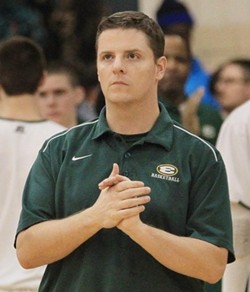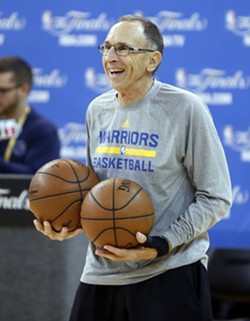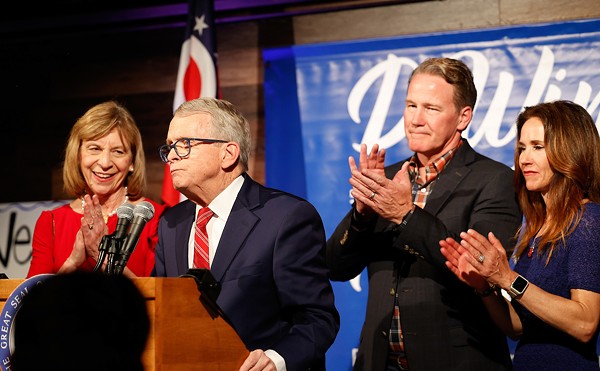But one of the positives has been the increasingly egalitarian and “humanistic” coaching style that has gained purchase over the last few decades. Those in their forties probably had a couple authoritarian coaches from the opposite end of the spectrum. You know, those screamers and bullies who seemed to get off on excoriating kids’ failures, calling to mind basketball coach Bobby Knight in their over-the-top antics.
Coaching styles are typically described as running the range from the autocratic, my-way-or-the-highway orientation to democratic, which includes some shared decision-making to the humanistic, where the player has input into all the sports different aspects. This isn’t to say that they run the program or make the final decision, but it’s geared toward them with their input, looking to actualize and engage them.
NBA Is All About the Players
The NBA is completely humanistic at this point, though not without its autocratic aspects. Coaches typically decide the offensive and defensive sets and gameplan, not to mention substitutions.
Even a dozen years ago, coaches used to call the plays every time down the court. That’s obviously changed as more offensive control has been ceded to the players as the physicality’s increased. (The speed and athleticism of today’s players almost demands more split-second, on-the-floor decision-making than the older, slower style of play.)
“From day one really in my experience of the league with most of the coaches I’ve been with, it’s pretty much, ‘You and me. You’re an adult, you might be a young adult, I’m an adult.’ And yes, I’m an authority figure and perhaps I have to say things at times that you don’t want to hear, but it’s much more of a relational this way – horizontal relationship,” says Golden State Assistant Coach Ron Adams. “I think that’s the best way to operate. Now you have coaches that are a bit more adamant and maybe a bit more aggressive at times, but it really goes back to a relational level because I don’t think anything else works anymore.”
Part of it is cultural. The nature of basketball has changed in the social media age, and with the unblinking 24-7 sports/news cycle, the level of attention, good and bad, is unprecedented. That’s one reason the relationship with pro players needs to be one-to-one, man-to-man.
“This isn’t the old days. You can’t be a hard ass, you can’t be a dumb ass coach,” Adams says. “You have to recognize the pressure on the players is so much greater than it was before. All these old guys sitting on the sidelines judging these guys, they never had to go through what these guys have to go through in terms of scrutinization.”
Beyond just the changing culture is the fact that players are coming into the league younger and younger. Quality NBA players rarely play four years, and as a result, coaches have to baby less mature, less equipped players adding weight in developmental responsibilities.
“[In the past] so many players stayed in college. They had good college coaches and came in more polished,” says Adams. “So at our level now, we’re doing stuff that the colleges used to do. So it’s changed. The mindset has changed. These guys are instant sound-bite guys. They’re always on the phones and distractions galore.”
Not About Volume, It’s About Demeanor
Eric Flannery coaches the Saint Edwards High School basketball team and is an assistant on the U.S. Junior National Select Team. He’s watched as some of his friends who yell and scream lost their jobs, though he thinks it’s more about the impact of their behavior – they didn’t win, so they lost their jobs. If you’re a calm guy and don’t win, you face the same fate.
For his part, Coach Flannery admits to yelling and screaming, to make himself heard on the court, and in private or in the locker room in front of teammates, but is firm on the idea of never demeaning a player in public, in front of other people. Flannery believes you get the respect you give. Once you establish that bond, it’s less important whether you yell than how you express it.
“I think if you have the respect of your players, you can yell and scream at them all you want. I think they would take it the right way if you present it in the right way,” Flannery says. “Kids know when you don’t know and they know when you do. If you come across as knowledgeable and having the best interests of the team at heart, you can get away with doing a lot of things as an adult, whether its yelling or cussing every once in a while. If you handle things the right way, your demeanor doesn’t become such an issue.”
Just like anything in life, being transparent about your motives and honest with your intentions goes a long way to earning trust. Even if it’s accompanied by some hard love.
“I have kids that say to me, you’re picking on me a lot, and I say it’s because you’re screwing up a lot,” Flannery laughs. “It’s not because I don’t like you, it’s because I’m trying to make you better and I’m trying to correct the mistakes you’re making. If you share your message with the kid then they appreciate your message more, if the context is right. How you come across when you come across is a huge factor.”
Past generations believed much like the strap or Mother Superior’s ruler that discipline only came through submission. It’s probably a weird outgrowth of our country’s Puritanical beginnings. But having consequences isn’t the same as being a dick.
“Discipline is huge and I think it’s important. We need as coaches, especially with younger kids; we need to instill that discipline. But yelling and screaming at a kid is not really the right way to instill discipline. That’s more as an adult showing how great I am,” Flannery says. “There need to be consequences but that doesn’t mean getting into their face. It means not playing or not being rewarded for what it is you’re doing. There are just other ways to build that respect and discipline.”
Engage the Athlete, Build Their Motivation
With younger children it’s often necessary to be more authoritarian. They don’t understand the game and need to be taught and given boundaries. But as they grow physically and mentally with the game it’s important they get more responsibility so that they feel bought in.

To some extent, that benefited athletes by relieving them of responsibility for the most grueling aspect of their training. Many would show up to the practice pleasantly unaware of the nature of that day’s work.
“Some of the athletes were at such a high level they stressed about the workout if they knew what it was going to be, to the point where it impacted their sleep the night before because those are the hardest workouts,” Jenny, a former runner/ballplayer himself. “They would rather not know what the workouts would be so they don’t wake up at night thinking about it.”
But there’s a trade-off. Athletes lacked self-confidence to set those parts of their regimen in which they didn’t have input. In reinforces the humanistic coaching belief that engaging the athlete allows them to take ownership which increases their commitment.
This is even true in basketball. Think about how many players throw off their responsibility and blame the failings on the gameplan or the play calls or their playing time – all the things they can’t control. As the old line goes, with great power comes great responsibility. The corollary would probably be, “no decision-making power, no accountability.”
“What facilitates intrinsic motivation is the autonomy piece to it. Are you giving the athlete choices?” Jenny says. “like, ‘Here are some options at the end, which one do you feel is the best choice?’ and as you go through the whole coaching process, where you say the younger and less experienced you are you are going to be more dictatorial, but as they age and gain more experience you should be giving them some decision making responsibility, because feelings of competence, relatedness and autonomy help facilitate intrinsic motivation.”
Fairness Is As Fairness Does
One thing that has changed for Flannery as he has gone along is he’s moved from a lot of rules to what he describes as standards. This allows him to be a bit more flexible and to treat kids more as individuals. It’s not about treating everyone alike, he explains, but treating everyone fairly.
“We no longer have rules, we have standards by which you hold each other accountable and which I hold you accountable as a player,” he says.
“I used to have one of these rules – if you’re late for practice or you miss a practice, you can’t start the next game or maybe play the next game,” Flannery continues. “Well I have kids that live 5 minutes from school and live 55 minutes from school… If I have a concrete rule for everybody, that is setting yourself up for failure. Now I have standards like I expect you to be here on time and your teammates expect you to be on time.
On a certain level it’s just common sense and an acknowledgment of a simpler truth.
“You’re not going to treat LeBron James the same way you treat Matthew Dellavedova. You just can’t. However you have to hold them both to the same standard,” he says. “LBJ can’t show up to practice late every day and it’s okay. So there are standards you have to live by, but there is some leeway for different people in how you treat them.”
Just as many people have discovered, it’s not so much the job that you love in the end, but the people you meet doing it. We believe that’s true for Coach Flannery, though we know he loves his job as well. That’s also true for Adams, who says he’s always known that the game is a business first and foremost.
“I always understood that even in college, but I had to make it more than that, or you can’t do it,” he says. “There has to be a certain amount of enjoyment. So I’ve always gotten enjoyment out of the players and the people around the team. I look back even my two years here. It was great to win a championship, but the relationships and the great people I’ve been around are probably more important than anything else. I always measure a situation by the relationships, because you go mad otherwise.”















